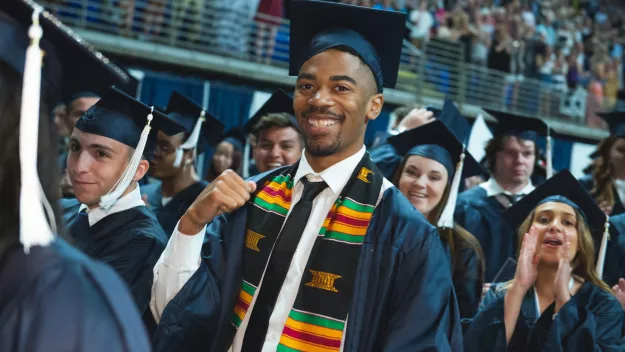

Study the science behind health as you learn how the interaction among biological, behavioral, psychological, sociocultural, and environmental factors influence human health and illness. Interdisciplinary course work will help you focus on the development of interventions to improve health outcomes.
Understand the fundamental biological, behavioral, social, cultural, and environmental processes that influence health and disease.
Explain how the fundamental processes underlying health and disease can interact to produce individual differences in health and health disparities among groups.
Critically evaluate empirical research on health and disease, explaining implications and limitations to the lay public.
Understand and apply ethical principles in the conduct of research and professional practice and in the analyses and implementations of health-related policies and programs.
Plan, implement, and evaluate health promotion/disease prevention programs for diverse populations.Your biobehavioral health degree courses will cover topics in biobehavioral health, biology, epidemiology, physiology, nutrition, genetics, and statistics.
This integrated study of the science behind health connects the following approaches:
Introduction to an interdisciplinary study of health, examining the interaction of biological processes and behavior on health.
This course may be used to satisfy the Health and Wellness (GHW) requirement. BBH 302 Diversity and HealthExamines the relationship diverse personal and sociocultural factors (e.g., socioeconomic class, race-ethnicity, gender, age, and sexual orientation) have with health.
Prerequisite PSYCH 100 or SOC 1 BBH 310 Research Strategies for Studying Biobehavioral HealthSurveys the various research methodologies used in biomedical research, including case, epidemiological, quasiexperimental and experimental approaches.
Prerequisite BBH 101 and STAT 200 BBH 311 Interdisciplinary Integration in Biobehavioral HealthA review of literature relevant to the concepts and findings of different scientific domains as they apply to biobehavioral health.
Prerequisite BBH 101 and BIOL 110 and PSYCH 100 BBH 316 Foundations and Principles of Health Promotion Basic exposure and skills development in theory and practice in health promotion. Prerequisite BBH 411W Research and Applications in Biobehavioral Health Research methods, multi-level analyses, and applications in biobehavioral health. Prerequisite BBH 101 and BBH 310 and STAT 200 BBH 440 (U.S.; IL) Principles of Epidemiology Theory of epidemiology and significant case studies; potential applications to health care. Prerequisite (BBH 101 or BIOL 110 or HPA 310) and (STAT 200 or STAT 250) BIOL 110 Biology: Basic Concepts and BiodiversityA study of the fundamental concepts of biology, including the evolution of the major groups of organisms. This is the first biology course taken by students who intend to major in biology. It provides a foundation in the basic concepts that govern life, including the evolutionary processes that have led to the biodiversity seen today.
The credits earned in this course may be applied toward the Natural Sciences (GN) requirement. BIOL 161 Human Anatomy and Physiology I - Lecture Human Anatomy and Physiology I - Lecture BIOL 163 Human Anatomy and Physiology IIStudents will build a strong foundation in the form and function of the human body from the cellular to the gross anatomical level.
Prerequisite NUTR 251 Introductory Principles of NutritionThe nutrients: food sources and physiological functions as related to human growth and well-being throughout life; current nutrition issues.
This course can be used to satisfy the Health and Wellness (GHW) requirement. PSYCH 100 Introductory Psychology Introduction to general psychology; principles of human behavior and their applications.The credits earned in this course may be applied toward the Social and Behavioral Sciences (GS) requirement.
Courses taken to fulfill this requirement may not be double counted toward the 12 credits of Basic Sciences.
CHEM 110 Chemical Principles IFirst semester of a two-semester, comprehensive general chemistry course that introduces students to the basic principles of chemistry with an emphasis on the relationships between the microscopic structure and the macroscopic properties of matter.
Prerequisite Completion of or placement beyond MATH 22 CHEM 130 Introduction to General, Organic and BiochemistryThis course is a one-semester rigorous college-level introductory Chemistry course covering the fundamental principles of general, organic, and biochemistry. One year of high school chemistry is strongly recommended.
Prerequisite Completion or placement beyond MATH 21 MICRB 106 Elementary MicrobiologyA survey course in microbiology for non-majors, this course focuses on the roles of microbes in human health and disease, agriculture, biotechnology, and other areas of societal impact.
This course can be used to satisfy the Natural Sciences (GN) requirement.The biological basis of human behavior within the context of primate biology, behavior, and evolution.
This course can be used to satisfy the Natural Sciences (GN) requirement. BIOL 155 Introduction to the Biology of AgingExamination of human aging from a biological perspective. Population demographics, physiological and pathological changes, and healthy lifestyles are discussed. Students who have passed BIOL 409 may not schedule this course.
This course course may be used to satisfy the Natural Sciences (GN) requirement. CHEM 110 Chemical Principles IFirst semester of a two-semester, comprehensive general chemistry course that introduces students to the basic principles of chemistry with an emphasis on the relationships between the microscopic structure and the macroscopic properties of matter.
Prerequisite Completion of or placement beyond MATH 22 CHEM 111 Experimental Chemistry I Introduction to quantitative experimentation in chemistry. Prerequisite or Concurrent CHEM 110 or CHEM 106 CHEM 202 Fundamentals of Organic Chemistry IIntroduction to organic chemistry, with emphasis on the properties of organic compounds of biochemical importance.
Prerequisite CHEM 101 or CHEM 106 or CHEM 110 EARTH 103N Earth in the Future: Predicting Climate Change and Its Impacts Over the Next CenturyClimate predictions for the coming century are utilized to examine potential impacts on regions, sectors of society, and natural ecosystems.
The credits earned in this course may be applied toward the Natural Sciences (GN) requirement. EGEE 101 Energy and the EnvironmentEnergy utilization and technological development, energy resources, conversion and consequences on the local and global environment, and future energy alternatives.
The credits earned in this course may be applied toward the Natural Sciences (GN) requirement. EGEE 102 Energy Conservation for Environmental ProtectionExposure to energy efficiency in day-to-day life to save money and energy, and thereby protect the environment.
The credits earned in this course may be applied toward the Natural Sciences (GN) requirement. MICRB 106 Elementary MicrobiologyA survey course in microbiology for non-majors, this course focuses on the roles of microbes in human health and disease, agriculture, biotechnology, and other areas of societal impact.
This course can be used to satisfy the Natural Sciences (GN) requirement. MICRB 107 Elementary Microbiology LaboratorySelected techniques used to observe, identify, and count bacteria; effects of chemical and physical agents on microorganisms. The combination of MICRB 106 GN and 107 GN must be taken to receive General Education credit in biology.
Prerequisite The credits earned in this course may be applied toward the Natural Sciences (GN) requirement. PSYCH 260 Neurological Bases of Human Behavior An introduction to biopsychology, emphasizing the structure and function of the human brain. PSYCH 470 Abnormal PsychologyCauses, dynamics, symptoms, and treatment of neuroses, psychoses, personality disorders, and other psychological disorders of adulthood.
Prerequisite PSYCH 100 and ( PSYCH 238 or PSYCH 243 or PSYCH 270)BBH courses chosen from a predetermined list in consultation with program. Additional course details and program requirements can be found in the Undergraduate Bulletin. Please consult with your adviser.
BBH 305 Introduction to Global Health Issues Course will develop awareness of contemporary issues in global health. Prerequisite BBH 315 Gender and Biobehavioral HealthInterdisciplinary study of gender, examining the interaction of biological, behavioral, and sociocultural factors on health differentials throughout the lifespan.
Prerequisite BBH 416 Health Promotion II: Planning, Implementation, and EvaluationPlanning, implementation, and evaluation of health promotion, prevention, and intervention programs; emphasizing evaluation.
Prerequisite BBH 310 and BBH 316 BBH 432 Biobehavioral Aspects of StressThis course will cover the way stress response occurs in humans and how those responses can affect other aspects of physical, psychological, behavioral, and cognitive functioning.
Prerequisite (BBH 101 or BBH 101H) and (BIOL 141 or BIOL 161) BBH 451 Pharmacological Influences on HealthBiological and behavioral aspects of therapeutic and recreational drug use and misuse, and their relationships to health.
Prerequisite BBH 101 and PSYCH 100 and (BIOL 141 or BIOL 161) PSYCH 260 Neurological Bases of Human Behavior An introduction to biopsychology, emphasizing the structure and function of the human brain. PrerequisitePrinciples of the voice mechanisms, preventing vocal abuse, and promoting vocal health across the lifespan.
The credits earned in this course may be applied toward the Health and Wellness (GHW) requirement. The credits earned in this course may be applied toward the United States Cultures (US) requirement. CSD 269 Deaf CultureExplores the economic, social, psychological, and political aspects of the deaf culture and its interaction with the majority hearing culture.
The credits earned in this course may be applied toward the Social and Behavioral Sciences (GS) requirement.
HPA 101 Introduction to Health Services OrganizationExamination of the social, political, historic, and scientific factors in the development and organization of health services.
HDFS 229 Infant and Child DevelopmentTheory, research, and methods of social/behavioral/biological sciences related to developmental processes and intervention during infancy and childhood.
This course can be used to satisfy the Social and Behavioral Sciences (GS) requirement. HDFS 239 Adolescent Development Social, behavioral, and biological development and intervention throughout adolescence. This course can be used to satisfy the Social and Behavioral Sciences (GS) requirement. HDFS 249N Adult Development and AgingPhysiological, psychological, and social development and intervention from young adulthood through old age.
This course can be used to satisfy the Social and Behavioral Sciences (GS) requirement. HDFS 250 Sexual Identity over the Life SpanConcepts of affectional and sexual orientation over life span, with emphasis on lesbian and gay male personal, family, and community adaptation.
HDFS 311 Human Development and Family Studies InterventionsSurvey of individual and family formal and informal intervention efforts; historical and current perspectives and approaches.
Prerequisite HDFS 315Y Family DevelopmentFamily functions over the life course; family from a multidisciplinary perspective, emphasizing adaptation and change.
Prerequisite HDFS 129 or 3 credits in social, behavioral, or human biological sciences HDFS 418 Family RelationshipsDynamics of family interaction; effects of parenthood, sibling and intergeneration relationships on family solidarity.
Prerequisite HDFS 312W and ( HDFS 315Y or HDFS 315W) HDFS 428 Infant DevelopmentConceptual analysis, assessment, and empirical investigation of normal and deviant development, prenatal through first two years of life.
Prerequisite (HDFS 229 or PSYCH 212) and HDFS 312W HDFS 429 Advanced Child DevelopmentProcesses of development during childhood from birth to adolescence. Emphasis on theory, method, and empirical research.
Prerequisite (HDFS 229 or PSYCH 212) and HDFS 312W HDFS 433 Developmental Transition to AdulthoodConceptual analysis and empirical investigation of interrelationships between developmental processes during the period of pubertal growth.
Prerequisite HDFS 239 and HDFS 312W HDFS 445 Development throughout AdulthoodProcesses of development and change of behavior from early adulthood through old age, emphasizing theory, method, and empirical research.
PrerequisiteHDFS 249 and ( HDFS 312W or PSYCH 301W ) and ( PSYCH 200 or STAT 200 or 3 credits of statistics) and (6 credits in HDFS or PSYCH or SOC)
HPA 57 Consumer Choices in Health CareIntroduction to consumers' role in health care decisions, including health benefits, physician and hospital choice, and end-of-life choices.
HPA 310 Health Care and Medical NeedsHealth care from an individual, family, and community standpoint illustrated with specific diseases and health problems.
Prerequisite (BBH 101 or BISC 004 or BIOL 141 ) and HPA 101 KINES 203 Medical Terminology for Allied Health ProfessionalsComprehensive review of terms related to functions, disorders, diagnosis, and treatment of body systems related to physical activity and movement.
PSYCH 212 Introduction to Developmental PsychologyDevelopmental principles; physical growth; linguistic, intellectual, emotional, and social development from infancy to maturity.
Prerequisite PSYCH 243 Introduction to Well-Being and Positive PsychologyApplying psychological knowledge to develop and maintain effective personal adjustment and well-being and positive social relations.
Prerequisite PSYCH 270 Introduction to Abnormal PsychologyThis course focuses on some of the topics and questions people most commonly ask about psychology: What are the different psychological disorders, and what are they like? How do clinicians diagnose someone with a disorder? What do therapists actuallydoin therapy?
Prerequisite PSYCH 441 Health PsychologyOverview of the field with an emphasis on how psychological research contributes to an understanding of health and behavior.
Prerequisite PSYCH 100 and 6 additional credits of PSYCH RPTM 120 Leisure and Human BehaviorLeisure from historical and contemporary perspectives, including forces shaping leisure behavior, and relationships among leisure, the environment, and social institutions.
Introduction to psychosocial and family development at all stages of the individual and family life cycle.
This course can be used to satisfy the Social and Behavioral Sciences (GS) requirement. HDFS 229 Infant and Child DevelopmentTheory, research, and methods of social/behavioral/biological sciences related to developmental processes and intervention during infancy and childhood.
This course can be used to satisfy the Social and Behavioral Sciences (GS) requirement. HDFS 239 Adolescent Development Social, behavioral, and biological development and intervention throughout adolescence. This course can be used to satisfy the Social and Behavioral Sciences (GS) requirement. HDFS 249N Adult Development and AgingPhysiological, psychological, and social development and intervention from young adulthood through old age.
This course can be used to satisfy the Social and Behavioral Sciences (GS) requirement.Examines bases for choices among values in personal and professional relations in human development processes and supporting services.
PrerequisitePlanning, implementation, and evaluation of health promotion, prevention, and intervention programs; emphasizing evaluation.
Prerequisite BBH 310 and BBH 316 HDFS 414 Resolving Human Development and Family ProblemsStrategies for, and roles of professional specialists in, the solution of problems in human development and family functioning.
Prerequisite HDFS 312W and 6 credits in human development and family studies or psychology HDFS 455 Development and Administration of Human Services ProgramsFundamentals of program development and administration of human service programs in community settings; emphasis given to program content, strategies, and the overall planning process.
Prerequisite PSYCH 441 Health PsychologyOverview of the field with an emphasis on how psychological research contributes to an understanding of health and behavior.
Prerequisite PSYCH 100 and 6 additional credits of PSYCHSome General Education requirements may be satisfied by courses required for the major. Students should work with an adviser to select courses.
These General Education Requirements are for students who started in summer 2023 or later. Students who started earlier can review the prior version of the general education requirements.
If you're ready to see when your courses will be offered, visit our public LionPATH course search (opens in new window) to start planning ahead.
Close Course List
You can use the knowledge you gain and the support of Penn State career resources to pursue careers in a variety of fields, depending on your goals.
View Career InformationThe following roles are often held by people with this type of degree:
Estimates of employment growth and total employment are provided by the U.S. Bureau of Labor Statistics and are subject to change. While these occupations are often pursued by graduates with this degree, individual outcomes may vary depending on a variety of factors. Penn State World Campus cannot guarantee employment in a given occupation.
The breadth of your health studies in the BBH degree program can help prepare you for entry-level positions in a range of health-related areas or place you on the path to advanced studies in fields such as:
The online Bachelor of Science in Biobehavioral Health program is not meant to provide adequate preparation for post-graduate medical training (for example: medical school, physician assistant programs, etc.) and likely will not satisfy the admission requirements for such programs. If you plan to pursue post-graduate work in one of these fields, please consult with your adviser as to how you might best prepare to meet the requirements.

From the day you're accepted as a student, you can access resources and tools provided by Penn State World Campus Career Services to further your career. These resources are beneficial whether you're searching for a job or advancing in an established career.
Get the resources you need to make informed decisions about your education. Request information on this program and other programs of interest by completing this form.
Learn about this program's tuition, fees, scholarship opportunities, grants, payment options, and military benefits.
Tuition, Fees, and AidUndergraduate tuition is calculated based on the number of credits for which you register and the number of total credits you have accrued at or transferred to Penn State. Tuition is due shortly after each semester begins and rates are assessed every semester of enrollment.
| How many credits do you plan to take per semester? | If you have 59 or fewer credits | If you have 60 or more credits |
|---|---|---|
| 11 or fewer | $632 per credit | $678 per credit |
| 12–19 | $7,678 per semester | $8,288 per semester |
Undergraduate students taking more than 19 credits will be charged the flat tuition rate plus the regular per credit hour rate for each credit above 19.
Some students may qualify for financial aid. Take the time to research financial aid, scholarships, and payment options as you prepare to apply. Military service members, veterans, and their spouses or dependents should explore these potential military education benefits and financial aid opportunities, as well. To view the detailed list of cost of attendance elements, select “World Campus” as the location on the tuition site.
Close Tuition, Fees, and AidThe interdisciplinary online biobehavioral health program is made for students who are adult learners, have already started their careers, or who may be working overseas or in the military.


Whether you are looking to finish your program as quickly as possible or balance your studies with your busy life, Penn State World Campus can help you achieve your education goals. Many students take one or two courses per semester.
How Quickly Can I Earn This Degree?Our online courses typically follow a 12- to 15-week semester cycle, and there are three semesters per year (spring, summer, and fall). If you plan to take a heavy course load, you should expect your course work to be your primary focus and discuss your schedule with your academic adviser.
Timelines may vary for students transferring credits from another school or based on course availability.
Close Set Your Own PaceThis program's convenient online format gives you the flexibility you need to study around your busy schedule. You can skip the lengthy commute without sacrificing the quality of your education and prepare yourself for more rewarding career opportunities without leaving your home.


Penn State has a history of more than 100 years of distance education, and World Campus has been a leader in online learning for more than two decades. Our online learning environment offers the same quality education that our students experience on campus.

Apply by October 31 to start January 13
Application InstructionsComplete your application and submit all required materials by the appropriate deadline. Your deadline will depend on the semester you plan to start your courses.
New students are encouraged to complete the FAFSA by March 1. Please visit the Office of Student Aid website for more information about applying for financial aid and recommended deadlines.
You will need the following items to complete your application: High school transcripts or GED transcript — First-year applicants are required to submit Self-Reported Academic Records (SRAR) when applying. Official high school transcripts for first-year applicants will only be required at the time a student accepts an offer of admission to Penn State. Transfer international students will need to submit their high school transcript before their application can be reviewed. Official college or university transcripts and/or official military transcripts (if applicable) — All college or university transcripts are required regardless of the length of time that has passed, the grades earned, or the accreditation of the institutions attended. Acceptance of transfer credit toward your degree is subject to final approval by the academic department. For detailed information, see the Transfer Students page. Transcripts not in English must be accompanied by a certified translation. English Proficiency — The language of instruction at Penn State is English. With some exceptions, international applicants must take and submit scores for the Test of English as a Foreign Language (TOEFL) or International English Language Testing System (IELTS). Minimum test scores and exceptions are found in the English Language Proficiency section on the Undergraduate Admissions International Requirements page. Visit the TOEFL website for testing information. Penn State's institutional code is 2660.
To begin the online application, you will need a Penn State account. Create a New Penn State Account If you have any problems during this process, contact an admissions counselor at [email protected] . Please note: Former Penn State students may not need to complete the admissions application or create a new Penn State account. Please visit our Returning Students page for instructions.
Review your information, digitally sign your application, and provide payment for the application fee ($65 domestic or $75 international).
All official documents should be sent to:
Undergraduate Admissions Office
The Pennsylvania State University
201 Shields Building
University Park, PA 16802
You can also have your transcripts sent electronically through Parchment, eScript-Safe, or the National Clearinghouse directly to Penn State from the college/university where course work was attempted.
After receiving your application, application fee, and all required materials, your application will be evaluated for admission. You can check your application status online. This will provide the most up‐to‐date information about the status of your application and is updated once daily, before 8:00 a.m. (ET). Once a decision has been made regarding your application, it will be available to you through the MyPennState portal.
For information on when you can expect an admissions decision, visit the Dates and Deadlines page of the Undergraduate Admissions website. Make sure you click the "+" sign to see these dates for World Campus Applicants (First-Year and Transfer).